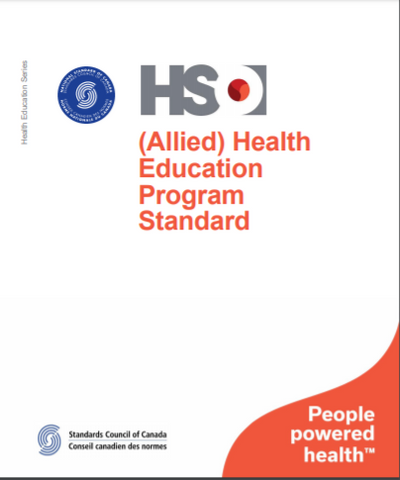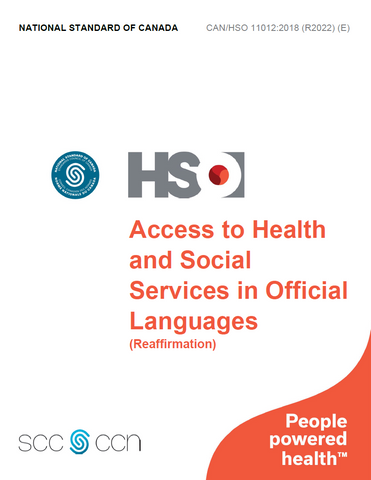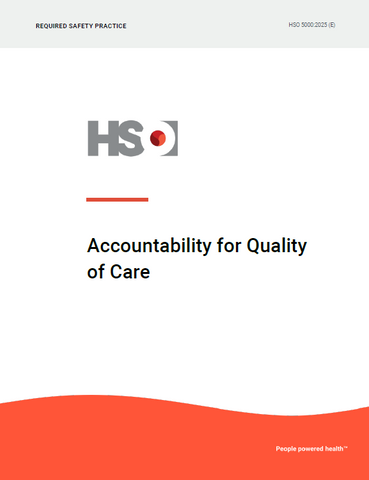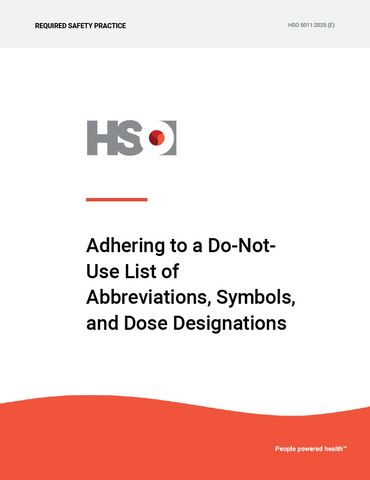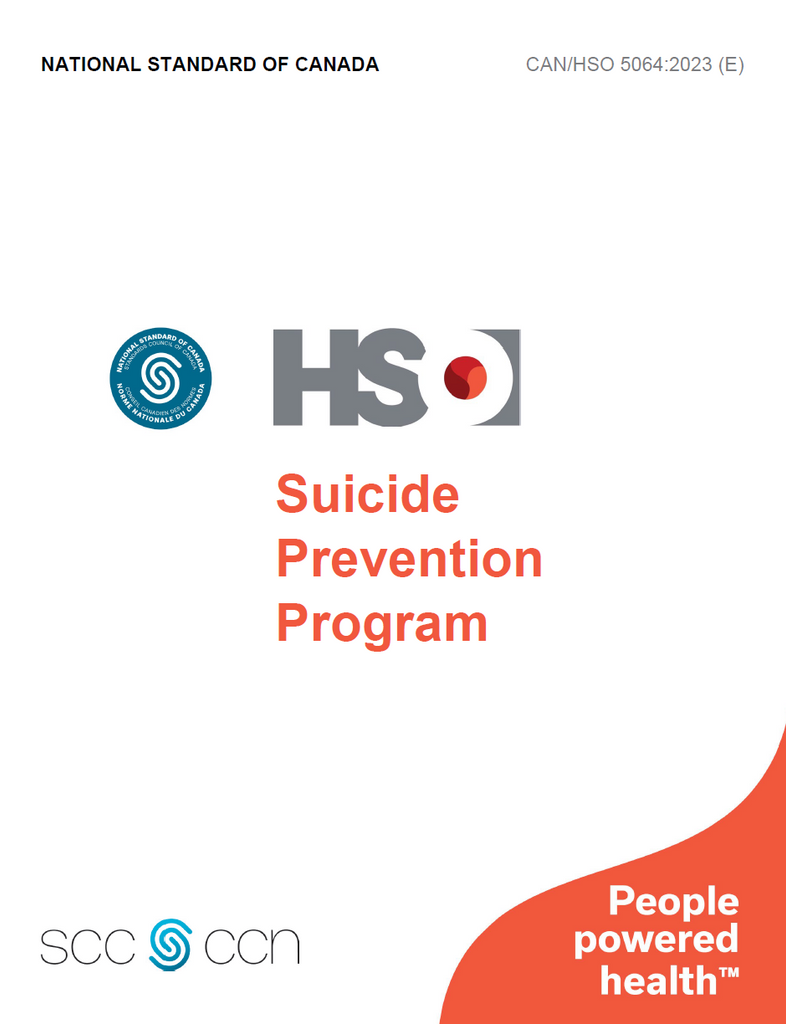
Suicide Prevention Program - CAN/HSO 5064:2023 (E)
About HSO's Standards
HSO’s standards are the foundation on which leading-edge accreditation programs and evidence-informed public policy are built. Standards create a strong people-centred health care system that stakeholders can rely on to enable people around the world to continuously improve quality of care.
HSO’s standards are formatted using the following structure:
- Section title. A section of the standard that relates to a specific topic.
- Clause. A thematic statement that introduces a set of criteria.
- Criteria. Requirements based on evidence that describe what is needed by people to achieve a particular activity. Each criterion outlines the intent, action, and accountability.
-
Guidelines. Additional information and evidence to support the implementation of each criterion.
About This Standard
CAN/HSO 5064:2023 (E) Suicide Prevention Program is a revision of HSO 5064:2009 (E) Suicide Prevention. The target audiences are policy makers, system partners, organization partners, and teams. The content addresses both population health and individual direct care. By including a population health (or macro) perspective and a direct care (or micro) perspective, the standard supports the creation of a comprehensive suicide prevention program across a defined health system.
The technical content of the standard is divided as follows:
- Comprehensive Suicide Prevention Program
- Routine Screening for Suicide Risk
- Assessment of Suicide Risk
- Safety Planning, Care Planning, and Treatment
- Postvention Services
The standard is intended for use by policy makers, system partners, organization partners, and teams. It provides:
- Policy makers and system partners with a quality and safety blueprint to guide policy development for equitable, safe, and appropriate suicide prevention services in their jurisdictions
- Policy makers, system partners, organization partners, and teams with guidance on establishing a comprehensive suicide prevention program from a population health perspective
- Policy makers, system partners, organization partners, and teams with guidance on working collaboratively across a defined health system in a way that is culturally safe and appropriate to the needs of diverse communities
- Organization partners and teams with guidance on providing routine screening and assessment for suicide risk as part of a comprehensive suicide prevention program
- Organization partners and teams with guidance enabling coordinated efforts for seamless transitions throughout the client’s care journey
- Organization partners and teams with guidance on providing evidence-informed suicide prevention, treatment, and postvention services
In addition to the target audiences listed above, the standard also provides:
- Clients, designated support persons, and communities with information on what to expect from a comprehensive suicide prevention program
- External assessment bodies with evidence-informed content to include in assessment programs for suicide prevention
The standard does not cover practices for systemic integration. For guidance on how the health system and its partners can work collaboratively to develop an integrated health system, users are encouraged to refer to the criteria in CAN/HSO 76000:2021 (E) Integrated People-Centred Health Systems.
This standard will be available to health and social services organizations as a resource document.
Under the direction of the HSO Suicide Prevention Working Group, select criteria from the CAN/HSO 5064:2023 (E) Suicide Prevention Program will be used as a Required Organizational Practice (ROP) by health and social services organizations participating in the Qmentum accreditation programs. The Required Organizational Practice (ROP) is intended to be used as part of a conformity assessment.
The published evidence used to inform this standard can be found in the bibliography.
This standard is intended to be used as part of a conformity assessment. This standard will undergo periodic maintenance. HSO will review and publish this standard on a schedule not to exceed five years from the date of publication.
Scope
Purpose
This standard provides guidance to health and social service policy makers, system partners, organization partners, and teams to develop comprehensive, coordinated suicide prevention programs in health and social service settings. The standard does not prescribe the use of a particular approach or treatment, but rather focuses on how a comprehensive, continuous, and coordinated suicide prevention program can meet the holistic needs of clients and their designated support persons who are served by a health system or care setting.
The standard specifies the accountabilities of stakeholders at all levels to work together toward a common vision for integrated, people-centred suicide prevention programs in their health systems. It defines the role of system partners and policy makers, health and social services organization partners, and teams, which include clients and their designated support persons in collaboratively designing and delivering a comprehensive suicide prevention program.
The standard does not cover practices for systemic integration.
This standard integrates the principles of equity, diversity, and inclusion outlined in Annex B.
Applicability
The standard applies to health and social service policy makers, system partners, organization partners, and teams to design, develop, and implement a comprehensive suicide prevention program within a defined jurisdiction.
The defined population for this standard is individuals of any age who may potentially be at risk for suicide or who are currently experiencing suicidal ideation and/or behaviour.
Acknowledgements
HSO is grateful to and acknowledges the valuable contributions of Health Canada. CAN/HSO 5064:2023 (E) Suicide Prevention Program is developed with support from Health Canada. The views expressed herein do not necessarily represent the views of Health Canada.
HSO is also grateful to and acknowledges the valuable contributions of the Canadian Patient Safety Institute, now Healthcare Excellence Canada, and the Mental Health Commission of Canada in developing the Suicide Risk Assessment Toolkit (2021) attached in Annex A of this standard. The toolkit has been reviewed by the HSO Suicide Prevention Working Group and verified for use, in close coordination with the Canadian Patient Safety Institute and Mental Health Commission of Canada, as a key resource to CAN/HSO 5064:2023 (E) Suicide Prevention Program.
HSO acknowledges that the Suicide Risk Assessment Toolkit is a freely available and publicly-accessible resource to all those who wish to review its content. Users of CAN/HSO 5064:2021 (E) Suicide Prevention Program are not obliged to purchase the Toolkit and can access the Toolkit, in both official languages, via the Healthcare Excellence Canada website and the Mental Health Commission of Canada website.
HSO has no legal rights to the licensing or distribution of Healthcare Excellence Canada and Mental Health Commission of Canada’s Suicide Risk Assessment Toolkit and acknowledges both the proprietary and legal rights to ownership of the Suicide Risk Assessment Toolkit by Healthcare Excellence Canada and Mental Health Commission of Canada.
HSO is an independent, not‑for‑profit corporation and is registered in Canada as a charity, in accordance with Canada Revenue Agency rules, with a mandate to enable and empower people around the world to continuously improve quality of care.
While designated as a Standards Development Organization by the Standards Council of Canada (SCC), HSO operates independently from SCC. HSO does not receive ongoing funding from SCC, other crown corporations of Canada, or federal or provincial entities.
HSO charges a nominal fee to help offset the associated costs of development and maintenance of HSO standards, as most HSO standards are self-funded.
If cost is a barrier to accessing an HSO standard, please email publications@healthstandards.org and a team member will assist you.
Standards available for purchase through this E-Store are considered HSO standards and must only be used in accordance with applicable HSO Terms of Use or client agreement and are not applicable for assessment purposes. If you are part of an assessment program such as the Qmentum accreditation program, with one of our partners including Accreditation Canada, Qualicor Europe, IQG, or IQMH, your assessment body will provide you with the assessment standard prior to the standard being incorporated into your program and used for surveys or assessment purposes. For information on assessment standards, or to obtain the version specific to your program, please contact your assessment provider.
Standards purchased online are delivered as printable PDF downloads. If you would like a copy printed and shipped to you, please email publications@healthstandards.org.

